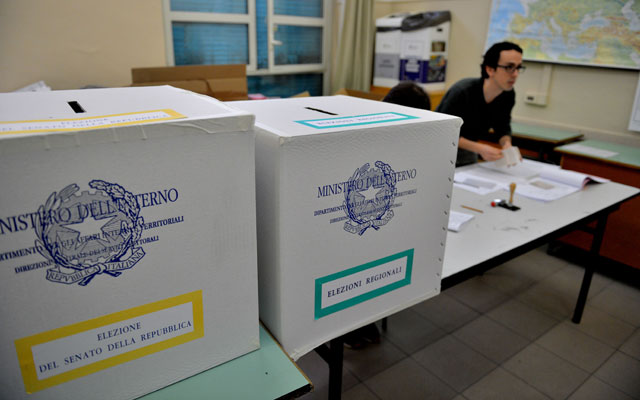Italian Voters Reject the Ideal of “Ever Closer Union” in Europe
Luke Coffey /
The recent Italian election results prove that Europeans are becoming fed up with the European Union.
Stagnant growth, rising unemployment, and public dissatisfaction are threatening to undermine the cohesion of the EU and cast the future of the European Project into doubt. While the European political elites in Brussels are calling for deeper political and economic integration as a solution to Europe’s problems, many across Europe are starting to realize that the Brussels power grab has gone too far.
When Italians went to the polls earlier this week, neither Pier Luigi Bersani’s center-left coalition nor Silvio Berlusconi’s coalition of center-right parties won enough seats to form a government outright. The former EU Commissioner and current caretaker Prime Minister Mario Monti’s centrist party was the biggest loser—getting only 10.5 percent of the vote. Consequently, this election result will bring the government formation process to paralysis in Italy and voters should expect new elections within one year.
However, the big winner of the elections was the controversial comedian Beppe Grillo’s Five-Star Movement. This populist and eurosceptic political party, formed only four years ago, is now the single largest party in Italy’s lower legislative house. Beppe Grillo’s euroscepticism and populism has great appeal to the average Italian voter who feels disenchanted by Brussels and Rome. The success of the Five-Star Movement, coupled with Mario Monti’s dire performance, demonstrates that Italians are tired of the status quo—those in Brussels should pay attention.
The Italian rejection of Brussels is reflective of the mood across Europe as a whole. The popularity of the EU today across Europe is at an all-time low. A recent poll conducted by the EU Commission found that only 33 percent of Europeans trust the EU. Only 30 percent of Europeans have a positive image of the EU.
To halt the Brussels power grab, the British parliament passed the 2011 European Union Act, which requires a popular referendum on any new transfer of powers to Brussels. Prime Minister David Cameron has also pledged to renegotiate Britain’s relationship with the EU to bring more powers back to London and then hold an referendum to decide if the U.K. should stay in the EU or leave.
The newly formed coalition government in the Netherlands is also calling for more powers to be brought back to the member states. Buried deep in the “program for government,” agreed by the parties forming the ruling coalition, is a line that states: “The Netherlands will ask the European Commission to list the policy areas that…could be transferred to national governments. We will also make proposals ourselves.”
The future of Europe is uncertain, but the Europe of the future is unlikely to look like the Europe of today. For those who believe in the concepts of direct elections, accountable politicians, diffusion of power, and transparent and wise use of taxpayer money, this is not a bad thing.
Over the years, power has been incrementally shifted to Brussels and away from the national capitals. Consequently, power has been moved further away from those who are impacted most. Now EU elites are seeing the consequences of this. Instead of increasing policy competencies in opaque institutions in Brussels, power should be returned back to the member states and to the people. Across Europe the ideal of “Ever Closer Union” is being firmly rejected.

